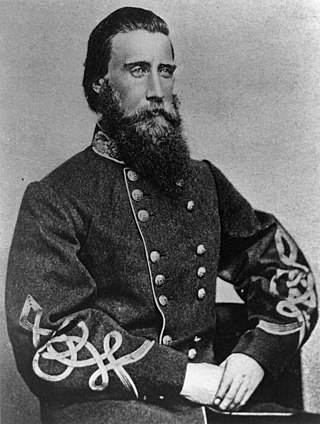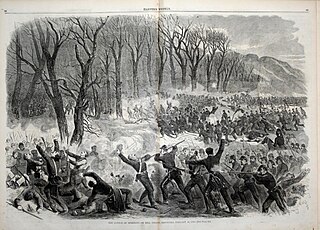
Albert Sidney Johnston was an American military officer who served as a general in three different armies: the Texian Army, the United States Army, and the Confederate States Army. He saw extensive combat during his 34-year military career, fighting actions in the Black Hawk War, the Texas-Indian Wars, the Mexican–American War, the Utah War, and the American Civil War, where he died on the battlefield.

The American Civil War was a civil war in the United States between the Union and the Confederacy, which was formed in 1861 by states that had seceded from the Union. The central conflict leading to war was a dispute over whether slavery should be permitted to expand into the western territories, leading to more slave states, or be prohibited from doing so, which many believed would place slavery on a course of ultimate extinction.

The Confederate States of America (CSA), commonly referred to as the Confederate States (C.S.), the Confederacy, or the South, was an unrecognized breakaway republic in the Southern United States that existed from February 8, 1861, to May 5, 1865. The Confederacy was composed of eleven U.S. states that declared secession; South Carolina, Mississippi, Florida, Alabama, Georgia, Louisiana, Texas, Virginia, Arkansas, Tennessee, and North Carolina; they warred against the United States during the American Civil War.

Jefferson F. Davis was an American politician who served as the first and only president of the Confederate States from 1861 to 1865. He represented Mississippi in the United States Senate and the House of Representatives as a member of the Democratic Party before the American Civil War. He was the United States Secretary of War from 1853 to 1857.

Joseph Eggleston Johnston was an American career army officer, who served in the United States Army during the Mexican–American War (1846–1848) and the Seminole Wars. After Virginia declared secession from the United States, he entered the Confederate States Army as one of its most senior general officers. From 1888 to 1889 he was a vice president, from 1889 to 1890 president, of the Aztec Club of 1847.

Braxton Bragg was an American army officer during the Second Seminole War and Mexican–American War and Confederate general in the Confederate Army during the American Civil War, serving in the Western Theater. His most important role was as commander of the Army of Mississippi, later renamed the Army of Tennessee, from June 1862 until December 1863.

The Confederate States Army, also called the Confederate Army or the Southern Army, was the military land force of the Confederate States of America during the American Civil War (1861–1865), fighting against the United States forces to win the independence of the Southern states and uphold and expand the institution of slavery. On February 28, 1861, the Provisional Confederate Congress established a provisional volunteer army and gave control over military operations and authority for mustering state forces and volunteers to the newly chosen Confederate States president, Jefferson Davis (1808-1889),. Davis was a graduate of the United States Military Academy, on the Hudson River at West Point, New York, colonel of a volunteer regiment during the Mexican–American War (1846-1848). He had also been a United States senator from Mississippi and served as U.S. Secretary of War under 14th President Franklin Pierce. On March 1, 1861, on behalf of the new Confederate States government, Davis assumed control of the military situation at Charleston Harbor in Charleston, South Carolina, where South Carolina state militia had besieged the longtime Federal Fort Sumter in Charleston harbor, held by a small U.S. Army garrison under the command of Major Robert Anderson. (1805-1871). By March 1861, the Provisional Congress of the Confederate States meeting in the temporary capital of Montgomery, Alabama, expanded the provisional military forces and established a more permanent regular Confederate States Army.

John Bell Hood was a Confederate general during the American Civil War. Hood's impetuosity led to high losses among his troops as he moved up in rank. Bruce Catton wrote that "the decision to replace Johnston with Hood was probably the single largest mistake that either government made during the war." Hood's education at the United States Military Academy led to a career as a junior officer in the infantry and cavalry of the antebellum U.S. Army in California and Texas. At the start of the Civil War, he offered his services to his adopted state of Texas. He achieved his reputation for aggressive leadership as a brigade commander in the army of Robert E. Lee during the Seven Days Battles in 1862, after which he was promoted to division command. He led a division under James Longstreet in the campaigns of 1862–63. At the Battle of Gettysburg, he was severely wounded, rendering his left arm mostly useless for the rest of his life. Transferred with many of Longstreet's troops to the Western Theater, Hood led a massive assault into a gap in the Union line at the Battle of Chickamauga but was wounded again, requiring the amputation of his right leg.

Lieutenant-General Leonidas Polk was an American Confederate military officer, a bishop of the Episcopal Diocese of Louisiana and founder of the Protestant Episcopal Church in the Confederate States of America, which separated from the Episcopal Church of the United States of America. He was a planter in Maury County, Tennessee, and a first cousin twice removed of President James K. Polk. He resigned his ecclesiastical position to become a major-general in the Confederate States Army, when he was called "Sewanee's Fighting Bishop". His official portrait at the University of the South depicts him as a bishop with his army uniform hanging nearby. He is often erroneously referred to as "Leonidas K. Polk" but he had no middle name and never signed any documents as such.

Neo-Confederates are groups and individuals who portray the Confederate States of America and its actions during the American Civil War in a positive light. The League of the South, the Sons of Confederate Veterans and other neo-Confederate organizations continue to defend the secession of the former Confederate States.

The Lost Cause of the Confederacy is an American pseudohistorical and historical negationist myth that claims the cause of the Confederate States during the American Civil War was just, heroic, and not centered on slavery. First enunciated in 1866, it has continued to influence racism, gender roles, and religious attitudes in the Southern United States into the 21st century. Historians have dismantled many parts of the Lost Cause mythos.

The Tullahoma campaign was a military operation conducted from June 24 to July 3, 1863, by the Union Army of the Cumberland under Maj. Gen. William Rosecrans, and is regarded as one of the most brilliant maneuvers of the American Civil War. Its effect was to drive the Confederates out of Middle Tennessee and to threaten the strategic city of Chattanooga.

The Battle of Mill Springs, also known as the Battle of Fishing Creek in the Confederacy, and the Battle of Logan's Cross Roads or Battle of Somerset in the Union, was fought in Wayne and Pulaski counties, near the current unincorporated community of Nancy, Kentucky, on January 19, 1862, as part of the American Civil War. The Union victory concluded an early Confederate offensive campaign in south central Kentucky.

The western theater of the American Civil War encompassed major military operations in the states of Alabama, Georgia, Florida, Mississippi, North Carolina, Kentucky, South Carolina and Tennessee, as well as Louisiana east of the Mississippi River. Operations on the coasts of these states, except for Mobile Bay, are considered part of the Lower Seaboard Theater. Most other operations east of the Appalachian Mountains are part of the eastern theater. Operations west of the Mississippi River took place in the trans-Mississippi theater.

Gods and Generals is a 2003 American epic war drama film written and directed by Ronald F. Maxwell. It is an adaptation of the 1996 novel of the same name by Jeffrey Shaara and prequel to Maxwell's 1993 film Gettysburg. Most of the film was personally financed by media mogul Ted Turner. The film follows the story of Stonewall Jackson from the beginning of the American Civil War to his death at the Battle of Chancellorsville.
Historiography examines how the past has been viewed or interpreted. Historiographic issues about the American Civil War include the name of the war, the origins or causes of the war, and President Abraham Lincoln's views and goals regarding slavery.

William Charles "Jack" Davis is an American historian who was a professor of history at Virginia Tech and the former director of programs at that school's Virginia Center for Civil War Studies. Specializing in the American Civil War, Davis has written more than 40 books on that subject and other aspects of early southern U.S. history, such as the Texas Revolution. He is the only three-time winner of the Jefferson Davis Prize for Confederate history and was awarded the Jules and Frances Landry Award for Southern History. His book Lone Star Rising has been called "the best one-volume history of the Texas revolution yet written".

The Battle of Augusta was an engagement during the American Civil War that took place on September 27, 1862, in Augusta, Kentucky, between the Bracken County Home Guard (Union) and the Confederate Second Kentucky Cavalry Regiment under command of Colonel Basil W. Duke, a brother-in-law of John H. Morgan. The skirmish resulted in a victory for the Confederacy but the number of Confederate casualties and lack of ammunition for his artillery caused Colonel Duke to abandon plans to cross over the Ohio River into Ohio. A result of the fighting was that twenty buildings were set on fire and destroyed.

The Stonewall Jackson Monument in Richmond, Virginia, was erected in honor of Thomas Jonathon "Stonewall" Jackson, a Confederate general. The monument was located at the centre of the crossing of Monument Avenue and North Arthur Ashe Boulevard, in Richmond, Virginia. The bronze equestrian statue was unveiled in 1919. Along this avenue were other statues including Robert E. Lee, J. E. B. Stewart, Jefferson Davis, Matthew Maury and more recently Arthur Ashe. Thomas Jackson is best known as one of Robert E. Lee's most trusted commanders throughout the early period of the American Civil War between Southern Confederate states and Northern Union states. He rose to prominence after his vital role in the Confederate victory at the First Battle of Bull Run in July 1861, continuing to command troops until his untimely death on May 10, 1863, after falling fatally ill following the amputation of his wounded arm.

The following is a list of scholarly resources related to Jefferson Davis.



















